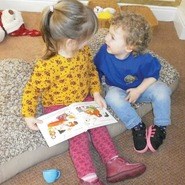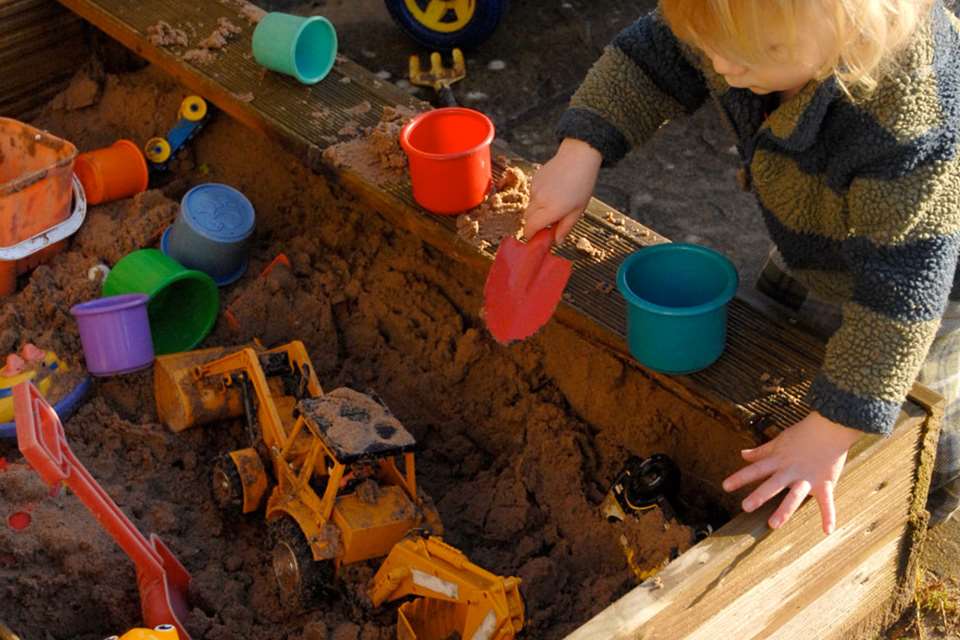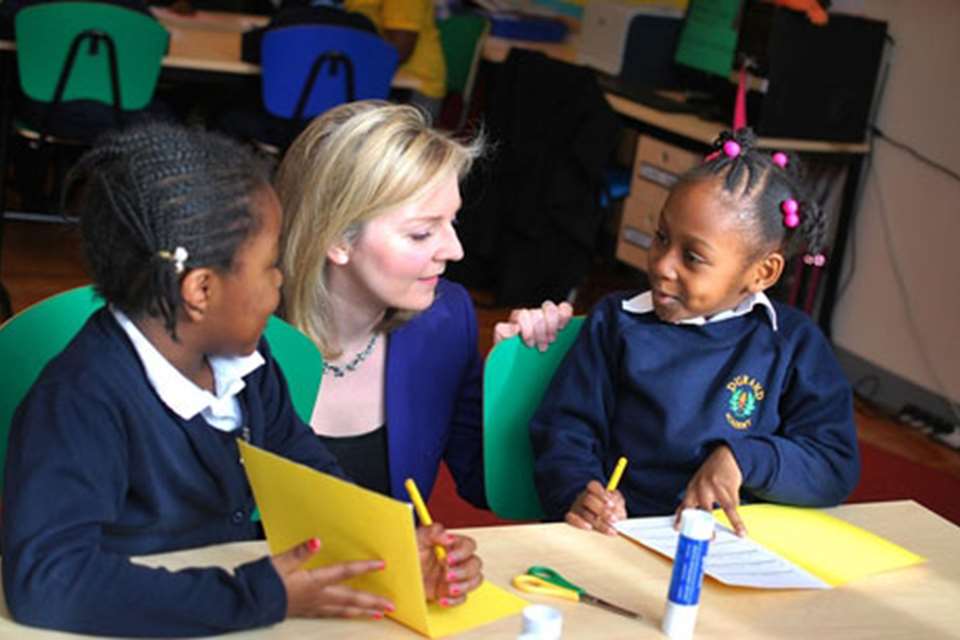Two-year-olds - We can meet twos' needs, say schools
Ruth Thomson
Monday, February 10, 2014
Some specialists have warned that schools will struggle to give two-year-olds sufficient support, but headteachers already caring for twos say they are well placed to succeed. By Gabriella Jozwiak

Some 375 schools currently offer funded nursery places for two-year-olds. But the Government wants more schools to offer provision to meet its target for 40 per cent of the most disadvantaged twos to access 15 hours free care a week from September 2014. Early years specialists are concerned schools cannot meet the specific learning, developmental and environmental needs of two-year-olds. But headteachers in schools already caring for twos argue their fears are unfounded.
Early years experts say it is not schools themselves that are the problem. As Sheringham Nursery School and Children's Centre headteacher Julian Grenier says, 'The question is about the quality of the setting, not where it is.'
Mr Grenier's concern is whether schools have the expertise to offer appropriate provision for twos. 'The provision cannot be understood as a kind of watered down nursery class,' he warns.
Early years consultant Helen Moylett shares this worry. She says twos need a key adult with whom they have a stable relationship. She argues that learning should be play-based and child-led; children need opportunities to move and be active, as well as small spaces where they can feel secure, and enjoy the odd cuddle.
'It's very difficult to get a two-year-old to sit down and do what you want them to, because they're just not developmentally ready for that approach,' she says. 'That's different from what teachers are used to doing.'
One of Ms Moylett's concerns is whether teachers will appreciate specific needs of disadvantaged twos, such as delayed language development. She says teachers or teaching assistants need specialist training. 'In some areas of disadvantage, headteachers already find it difficult to find suitably qualified staff to work with their older children, let alone qualified ones to work with the youngest. The temptation will be to employ people who are not well qualified.'
Cambridge University senior lecturer in education psychology David Whitebread says early years practitioners have a legitimate concern about the 'schoolification' of early years. He suggests twos in schools could be vulnerable to downward pressures to prepare them for their next educational level.
'Separate institutions are potentially more able to offer play-based, child-centred experiences for children,' says Mr Whitebread. 'They're not subject to the pressures of headteachers and senior staff saying "our reading results aren't very good, we'd better get the children starting earlier", which is entirely counter-productive.'
CHILDCARE MARKET
There are also economic factors to consider. Early years consultant Penny Tassoni is concerned that school-based provision could distort the childcare market. 'If local schools take two-year-olds, that means many childcare providers wouldn't be sustainable,' she says. 'Parents might see it as a solution if they've got a five-year-old in Reception and can just drop of a sibling. But what happens after the three-hour session if you've decimated childcare in the area?'
Ms Tassoni is also anxious about a policy that already allows schools to care for 'rising threes' - those who will turn three before the end of their first school term. She warns these children are being cared for under high child-to-staff ratios, and that Ofsted inspectors assess their care inaccurately because the provision is not registered as childcare. 'To have that as a basis is very dangerous; it's a slippery slope,' she says.
Oxford University professor of educational psychology Kathy Sylva suggests considering primary schools for the scheme is a good idea. 'Schools are well maintained, organised and generally well provisioned.'
But Ms Sylva suggests that the Government should implement more structures to assess if offering care for twos is right for a school, such as whether it already accepts three-year-olds. She says local authorities would have been well placed to support this development - 'but the proposal has come when local authority staff are haemorrhaging'.
Last month, Ms Sylva published a report with other nnacademics for The Sutton Trust. Sound Foundations called for staff working with funded twos to be at least Level 3 qualified. Ms Sylva says schools could achieve this requirement. 'An advantage a primary school has is that it will have well-trained staff,' she says.
Ms Sylva notes that staff turnover is lower in schools because salaries are higher, which gives children more stability.
The report also recommended settings have a good social mix to encourage language and social skills development among disadvantages twos. Ms Sylva suggests schools that only care for funded two-year-olds will be unable to achieve this blend. She says, 'That's an advantage of private nurseries; they could take non-funded twos and get a mix.'
PILOT SCHOOLS
Forty-nine schools across England are currently trialling care for twos as part of a Department for Education (DfE) pilot. Each has received up to £10,000 for minor adaptations, training and resources. The schools are also working with neighbouring schools and settings to encourage them to provide two-year-old provision.
Parbold Douglas Church of England Academy in Lancashire is one of those taking part. In September last year, it opened a nursery in a building within the school grounds, which had been used by a private provider for three years. It is registered separately with Ofsted and has more paid-for two-year-olds than funded twos because of its location in an affluent village.
Executive principal Paul Smith employed an early years teacher to head the twos programme. He says the decision to offer the care was driven by the school's 'moral purpose to provide education', adding, 'it helps me ensure children who join us at five have had a great start'.
The academy trust has also created a director of early learning position, filled by a qualified teacher with early years experience. Mr Smith says her role will dispel any concerns about schoolification of early years or downward pressures.
'She guides the direction the twos take - it's based on play and experience,' he says. 'In the past five years, we've taken a bottom-up approach. If we can get it right lower down, then you don't have the pressure at the top.'
Smith says the nursery is projected to be profitable, aided by initial investment from the academy trust, and that back office support was already in place. 'I can open 50 weeks a year without incurring significant costs,' he says. 'Schools are in an ideal position to offer very high-quality care and offset the cost to parents.' The academy trust plans to open satellite nurseries in the future in areas of need.
Oakwood Primary Academy in East Sussex is also taking part in the trials. Its on-site nursery opened in 2006 and began offering places for funded twos in April 2013. Nursery manager Sam Attwater says the school is redesigning its services to combine early years with Reception classes to create a 'foundation village'. It will offer care based on children's stage of development rather than age.
'The funded twos, especially at the beginning, have poor language and communication,' says Ms Attwater. 'We have to work really hard to build their skills. But we won't divide them by their age; we'll go at their pace.'
Ms Attwater says the Aurora Academies Trust that the school belongs to has a particular focus on early years learning and play. Even so, staff of all qualification levels involved with the twos' care will receive extra training.
Hatfield Community Free School in Hertfordshire is not part of the Government trial, but its school nursery is offering funded places for twos. The nursery opened with the school in October 2012, but is completely separate and run by a private provider.
Principal Sue Attard says the model works because it spreads financial risk. She supports plans for schools to deliver the provision. 'Two-year-olds have an entitlement to a really enriched play-based environment, and schools can provide that.'
The DfE will publish results of the trials by October this year.
CASE STUDIES: WEST EARLHAM AND NEWHALL GREEN
West Earlham Infant and Nursery School in Norfolk (Not DfE trial)
 'We took part in the original two-year-olds pilot in 2011,' says head teacher Binks Neate-Evans. 'After that, we kept up to four twos, but didn't offer specific provision. The local authority asked us to expand our provision in Easter 2013. It provided funding so we could convert a room for up to 32 places.
'We took part in the original two-year-olds pilot in 2011,' says head teacher Binks Neate-Evans. 'After that, we kept up to four twos, but didn't offer specific provision. The local authority asked us to expand our provision in Easter 2013. It provided funding so we could convert a room for up to 32 places.
'Despite the allocation, we only offer 24 places. Policy makers need to understand that having a room with lots of two-year-olds needs careful thought. It's not just about a good staff ratio - you have to manage relationships with key workers as well as all the other children. So we have 12 in the morning and the afternoon. Our classroom has rest places, baskets the children can get into, mini sofas and a dedicated outdoor area.
'Our early years leader is also the assistant head and a specialist. We also hired early years practitioners especially for the twos programme. The local authority funds us in the same way as other settings. We don't offer paid-for places because it's quite a complex model.
'We have a strong track record of engaging with families and do home visits for all children. One of our strengths as a school is that we already have infrastructure and professional support in place. We can access a behaviour support team, a councillor, an on-site social worker and offer adult learning courses. We're currently only open in term time.'
Newall Green Primary School, Manchester
'Before we'd even heard about the Government's two-year-olds initiative, we had identified a need to support twos in our area,' says head teacher Sarah Rudd.
'The school has always had a nursery for threes and fours, and we had a wing of the school that had been developed into a satellite Sure Start setting. Because of funding cuts, it was sitting empty. So from March 2013 we ran activity sessions for twos with their parents every morning for six weeks. Because the parents stayed, we didn't have to register with Ofsted.
'When the DfE approached the local authority about the twos trial, the council asked us to do it because of our former project. We agreed to register the provision formally, and we're currently expanding the setting by knocking together two classrooms.
'Soon we'll have room for up to 90 two-year-olds, but over two sessions that would require more than 10 staff. Although we received £10,000 of funding from the Government, the project is costing a lot more. We currently have three staff, two of whom have NNEB qualifications. We hope provision will expand over the year, but it depends how costs balance out.
'We're doing this because the benefits are immense in an inner-city area - we're already seeing improvements in the children.
We spent a lot of time researching how private and voluntary sector settings deliver two-year-old care. We consider our provision as separate from the school.'
MORE INFORMATION
- Elizabeth Truss speech on providing care for twos in schools, www.gov.uk/government/speeches/elizabeth-truss-speaks-about-childcare-reform
- For our coverage of the twos programme, visit our 'Big issue' page at www.nurseryworld.co.uk/free-early-education.









